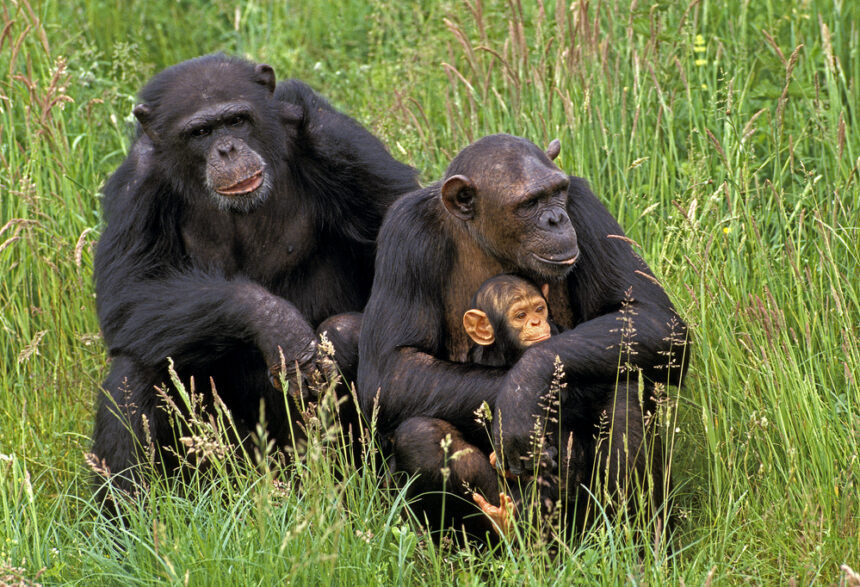
- Unlike chimpanzees, who derived the majority of their daily caloric intake from easily available foods such as fruits and leaves, early humans occupied a more complex foraging niche and relied on foods that they had to dig for (such as tubers buried underground or nuts in their shells) and hunting. These more complex foraging techniques take time and skill to master and are not easily learned by observation alone. The combination of foraging skills being difficult to master and necessary for survival for humans may be what distinguishes us from other apes. This explains why we are prolific teachers while our ape cousins are not.
- – Nicola Raihani, The social instinct: How cooperation shaped the world(p.92)
- Unlike chimpanzees, who derived the majority of their daily caloric intake from easily available foods such as fruits and leaves, early humans occupied a more complex foraging niche and relied on foods that they had to dig for (such as tubers buried underground or nuts in their shells) and hunting. These more complex foraging techniques take time and skill to master and are not easily learned by observation alone. The combination of foraging skills being difficult to master and necessary for survival for humans may be what distinguishes us from other apes. This explains why we are prolific teachers while our ape cousins are not.
HHumans could not choose the easy wins: they had to evolve skills that other apes lacked in order to survive in a more difficult ecological niche. The social instinct: How cooperation shaped the worldNicola Raihani talks about the skill of collaboration.
- From this dizzying journey of human evolution, one can draw a simple conclusion: we needed to cooperate to survive. This helps explain why there is almost no fossil record of other apes that coexisted with humans in the East African Rift Valley. Instead, our ape cousins inhabited less seasonal, more abundant environments, where extreme cooperation was not a prerequisite for survival. p. 77
Raihani sees insect cooperation as fundamentally different from human cooperation. She argues:
- …we have come to see highly social insect colonies (e.g., ants and termites) as individuals in their own right, or “superorganisms.” Social insect colonies often bear a striking resemblance to multicellular organisms like you and me. In particular, the design features and behavior of the “parts” that compose an insect can only be understood in relation to a higher level of organization, the colony. p. 25
She encourages us to think of an ant colony as a single unit, with the different types of ants within that unit functioning as component parts: the parts are designed (by evolution) to work together; they don’t consciously choose to work together or negotiate how to work together.
Could human populations also be seen as superorganisms, like ant colonies?
- Some evolutionary biologists believe the answer to these questions is yes. Like the insects mentioned above, humans have an extensive division of labor and are highly cooperative, even in situations where help is not directed to kin and no benefit is expected in return. These evolutionary biologists argue that the unique cooperative nature of the human species only makes sense if we see ourselves as cogs in a larger machine. That is, cooperation can only be understood in terms of the benefits it offers at the group level, which means that selection also operates at this higher level of biological organization. p. 27
But Raihani disagrees.
- For a collection of parts to be welded into a new kind of being, their interests must coincide almost perfectly and permanently. p. 27
Humans only cooperate sometimes. Often we have conflicts within groups, and the groups themselves sometimes cooperate with each other and sometimes compete with each other. Ants don’t apply game theory. Humans do.
“Humans cooperate strategically. They cooperate when they judge it to be in their personal interest to do so, but sometimes it goes against the interests of their own group or society as a whole.”
Members of an ant colony cooperate automatically: they always act in the interest of the survival of the colony as a whole. Humans cooperate strategically: we cooperate when we determine that it is in our personal interest to do so, but sometimes it goes against the interests of our group or society as a whole.
Laihani said human family structures also differ from other apes: For example, humans have evolved a cooperative approach to raising children.
- Many primates live in social groups, and humans are no exception. But humans are unique among great apes in that they live in stable family groups, with mothers receiving assistance from others in giving birth. The evolution of the family, with fathers, siblings, and grandparents, was the first critical step on our path to becoming a hyper-cooperative species. p. 47
Raihani says families should stay together long enough for older siblings to help raise younger ones.
- …Mothers can expect help from older children in raising younger ones, and humans are the only apes that do this.
- For those of us who live in modern industrial societies, it may be surprising to find that we have cooperative parenting because we usually live in relatively small families and older children often stop parenting before they can help younger ones. p.
Mothers have always received assistance in raising their children, but assistance comes in many forms.
- …For most of our lives on Earth, mothers were embedded in vast social networks and children were raised by multiple caregivers: fathers, siblings, aunts and uncles, grandparents, etc. Many modern human societies still live this way, but in many industrialized societies, these extended families have been replaced (to some extent) by more formal institutions such as schools and daycare centers. Formal institutions that provide child care are a logical extension of our cooperative, reproductive nature. p. 78
Raihani emphasizes that the human brain plays a unique role in human cooperation.
- … Some of the most important socio-cognitive traits that distinguish humans from other species—concern for the welfare of others, the ability to take the perspective of others and understand and share their mental states—are traits that are conspicuously lacking in other cooperatively reproducing species on Earth. … Humans are one of the most cooperative species on Earth, a trait we share with other cooperatively reproducing species. But our sociality rests on a different cognitive foundation. p. 126
An important difference compared to other species is that we recognize the trade-offs involved in choosing to cooperate.
- Broadly speaking, the cooperation problems we face every day can be summarized under one common heading: social dilemmas. They are social because our decisions affect others (although this is not always obvious), and they are dilemmas because individual and group interests conflict. p. 129
At the group level, we deal with these dilemmas by using rewards and punishments to motivate each other to cooperate.
An important reward for social contribution is a good reputation. People seek a good reputation because it increases the willingness of others to cooperate with us or support us. This represents another clearly human use of cognitive skills.
- …There is little evidence that other apes know or care what others think about them.
- …For humans, reputation management means putting ourselves in someone else’s shoes and inferring how that person’s beliefs and impressions might change under different scenarios. p. 159
Raihani believes this is crucial for the development of specialization and trade.
- Without a system for tracking and monitoring the reputations of others, the complex systems of mutual transactions that characterize all human societies would never have emerged. p.
But our heuristics for tracking reputation can lead us astray.
- We say it is good to raise money for charity or to protect the environment, but we condemn corporations if they make a profit from trying to achieve those ends. Because we cannot accept that both profit and good causes exist simultaneously, we tend to choose outcomes, people, and corporations that do not benefit good causes in any way, over corporations that receive a share of the profits they generate. p. 181
I think there is a systematic tendency for people to give disproportionately high status to nonprofits and disproportionately low status to for-profit companies.
This was new information for me.
- The classical view of ancestral (pre-agricultural) human societies is that of small, bounded communities of a few dozen people, with “each of our ancestors going on a camping trip that lasted practically a lifetime.” But this view turns out to be rather outdated. Humans were (as they are today) embedded in vast social networks, with many of our closest friends and family living far away. The average male chimpanzee may interact with only 20 other males in his lifetime, while recent estimates put the social universe of the average hunter-gatherer at around 1,000 people. p. 193
Still, I don’t believe that ancestral societies were capable of organizing social institutions to govern groups larger than Dunbar’s number of about 150 people. Rather, I think something like clan rule may have emerged.
Raihani points out that our ability to cooperate also increases our ability to do harm.
- Early humans gradually developed the ability to overcome the challenges that nature posed to them by working together. Problems like food shortages, lack of water, and dangerous predators could all be alleviated by working together. However, as a result, other humans became our main threat. We were no longer fighting nature, but each other. p. 207
- Cooperation is preferred when it is a competitive advantage. As a result, cooperation frequently involves casualties (indeed, casualty-free cooperation is the hardest to achieve). p. 236
Humans have become understandably afraid of each other, she says.
- … Delusions may be a feature, not a flaw, of our psychology. I am not claiming that the extreme delusions associated with psychiatric disorders such as schizophrenia are an evolutionary advantage. But when low in intensity, delusions may play an important role in detecting and dealing with social threats. p. 209-210
For more information on these topics,
One leaves Social instincts Understanding the complexities of human cooperation. As an individual in a group, I can choose to cooperate or withdraw in different circumstances. The group must motivate me to choose cooperation. Beyond the group level, the larger society must leverage group cooperation. Highly cohesive groups can behave in ways that are corrupting and damaging to the larger society. Organizations must function to channel group cooperation constructively.
Human cooperation is both a wonderful and precarious thing.





